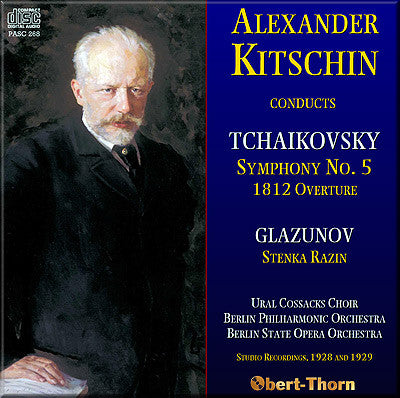
This album is included in the following sets:
This set contains the following albums:
- Producer's Note
- Full Track Listing
- Cover Art
Fascinating, individualistic orchestral recordings by Kitschin
Obert-Thorn transfers of this almost-unknown conductor demand your attention!
Virtually nothing is known about conductor Alexander Kitschin, save for the fact that he was married to soprano Xenia Belmas (1889 - 1981), emigrated with her from the Soviet Union to Germany in 1921, and moved to South Africa with her in 1938. He accompanied her on a number of opera aria recordings made for Grammophon/Polydor in the late 1920s – and these three lone orchestral recordings. Kitschin’s interpretations appear to be in the tradition of such other colorful, highly individualistic Russian-born interpreters as Coates and Golovanov; and from the evidence presented here, he was clearly in their league.
The sources for the transfers presented here were German Polydor pressings. The cuts in the finale of the Tchaikovsky Fifth were not dictated by 78 rpm side lengths; indeed, the symphony ran to eleven sides, and a violin solo was added to fill out the album. The original discs were credited to “The Opera-Orchestra, Berlin”. WERM claims this is the Berlin-Charlottenburg Opera Orchestra, but the horn player in the second movement appears to be the same one featured in Leo Blech’s Berlin State Opera Orchestra recording of two years later (Pristine Audio PASC 181), albeit without the cracked note that mars his solo there.
Mark Obert-Thorn, reissue producer
-
GLAZUNOV Stenka Razin, Symphonic Poem, Op. 13
Berlin Philharmonic Orchestra
Recorded 1928 in Berlin
Matrix nos.: 968 ½ bm, 969 ½bm, 970 bm and 971 bm
First issued on Grammophon/Polydor 95088 and 95089
-
TCHAIKOVSKY Ouverture Solennelle '1812', Op. 49
Ural Cossacks Choir
Berlin Philharmonic Orchestra
Recorded 1928 in Berlin
Matrix nos.: 857 ½ bm, 859 bm, 860 ½ bm and 858 bm
First issued on Grammophon/Polydor 95054 and 95055
-
TCHAIKOVSKY Symphony No. 5 in E minor, Op. 64
Berlin State Opera Orchestra
Recorded 1928 and 1929 in Berlin
Matrix nos.: 687 Bi I, 688 Bi I, 689 Bi I, 690 Bi I, 843 bm, 844 bm, 845 bm, 616 bm, 617 bm, 621 bm, 622 bm
First issued on Grammophon/Polydor 95056 through 95061
Alexander Kitschin, conductor
Producer and Audio Restoration Engineer: Mark Obert-Thorn
Cover artwork: detail from Pyotr Ilyich Tchaikovsky by Nikolay Kuznetsov, 1893
Special thanks to Nathan Brown and Charles Niss for providing source material
Total duration: 72:21
MusicWeb International Review
What is undeniable is the flair, excitement, and extremes generated by this unknown conductor
This is exciting. We have an almost unknown conductor, little
known recordings, including a major symphonic statement, first
class Polydor pressings, and splendid restorations by Mark Obert-Thorn.
The conductor is Alexander Kitschin, about whom almost nothing
is known. He was married to soprano Xenia Belmas, and – I’m
reliant on the brief notes for my information – he emigrated
to Germany with her from the Soviet Union in 1921. They moved
to South Africa in 1938. He accompanied her on some vocal discs
in Berlin, as well as these three orchestral outings. All were
made in Berlin, and even here there’s been some debate as to
attribution. The Tchaikovsky Symphony is label-credited to ‘The
Opera-Orchestra, Berlin’ but it’s been ascribed elsewhere to
the Berlin-Charlottenburg Opera Orchestra. Obert-Thorn thinks
it’s actually the Berlin State Opera Orchestra, who recorded
the work two years later for Leo Blech, who ironically later
trod the same journey as Kitschin, only in reverse, ending up
in Russia.
Kitschin’s conducting ethos, on the basis of the symphony in
particular, might be generally likened to such outsize individualists
as Mengelberg, Coates, Stokowski, and Golovanov. In another
twist, I assume he was living in South Africa at around the
same time as Albert Coates, whose conducting his so resembles,
so maybe some trace remains of him there, as some recorded traces
do of Coates in broadcast performances.
I don’t think I’ve ever heard the Fifth open in such a way as
here; a doleful, trudging, hugely introspective tempo, but one
that is, amazingly, just about sustained through the opening
paragraphs. Thenceforth we are treated to a remarkable display
of personalised music making – powerful moments when the music
stop-starts, slows down, speeds up. Rhythms are hugely flexible,
and things are taken to phrasal and expressive limits. The slow
movement is not especially slow in any way, but as throughout
it’s the variety of phrasing and of orchestral colour that lends
this performance its strategic purpose. He encourages distinctive
wind playing and phrasing, and brings the orchestra along with
him to a remarkable degree. There are cuts in the finale but
these were, I think, not unusual at the time and even later
conductors, such as Schmidt-Isserstedt and Sargent, used them.
If you’ve had the good fortune to hear Coates’s 1922 traversal
of the symphony you will certainly note a kind of kinship of
interpretation. What is undeniable is the flair, excitement,
and extremes generated by this unknown conductor.
As a bonus we have Glazunov’s Stenka Razin, in a purposeful,
powerful traversal, and the ‘1812’, with the full-blooded contribution
of the Ural Cossacks Choir.
These set the seal on a rather amazing disc.
Jonathan Woolf

